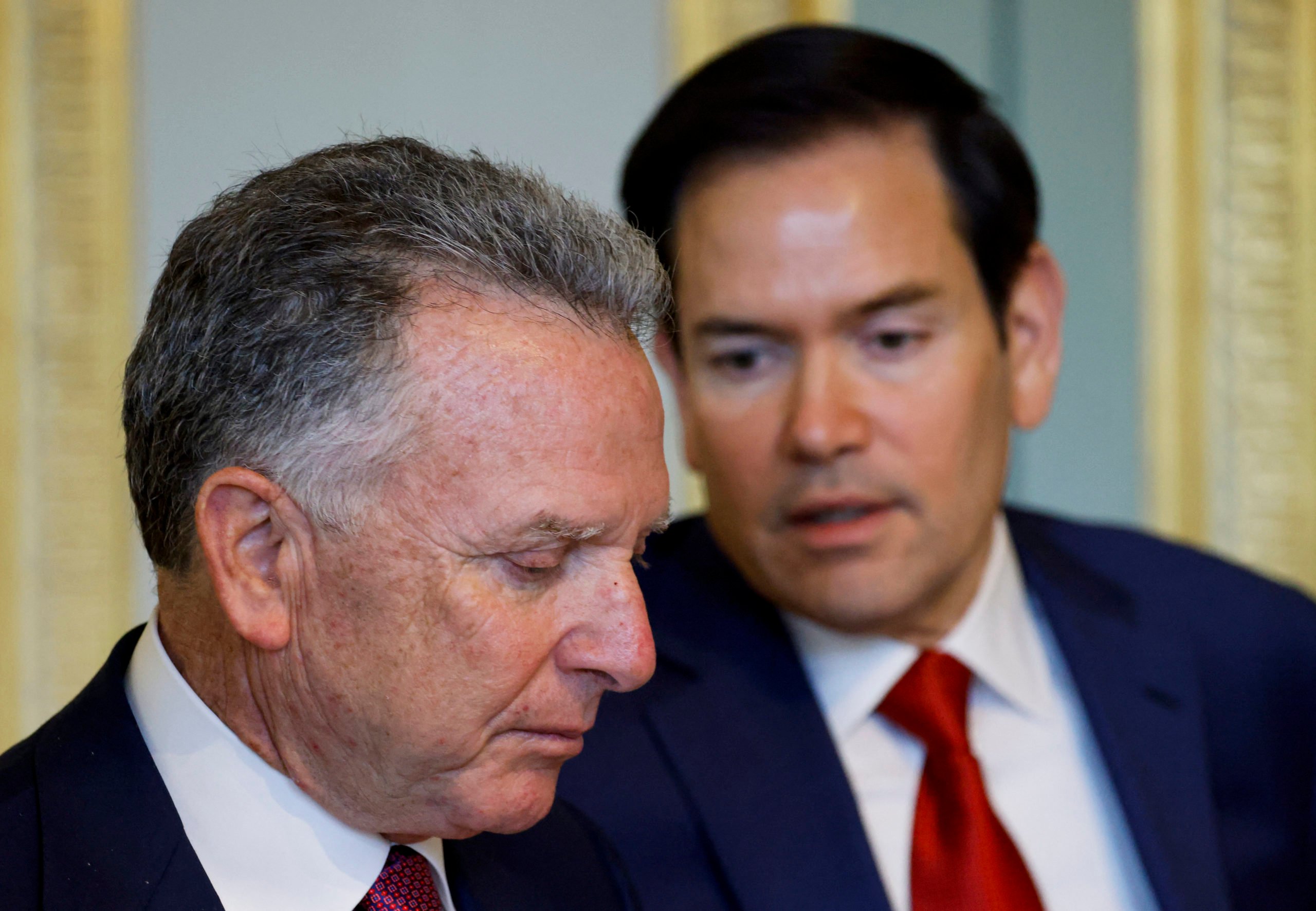A strike against Iran would torpedo the Trump administration’s attempts at peace, Middle East experts told the Daily Caller.
Israel “has not ruled out” a limited strike against Iran’s nuclear facilities, Reuters first reported in April. The report follows Trump’s meeting with Israeli Prime Minister Benjamin Netanyahu.
Israel was planning to attack Iranian nuclear facilities potentially next month but was opposed by Trump, administration officials and others familiar told the New York Times (NYT).
“I think that Iran has a chance to have a great country and to live happily without death,” Trump later told reporters, according to the NYT. “That’s my first option. If there’s a second option, I think it would be very bad for Iran, and I think Iran is wanting to talk.”
Trump told Time Magazine he is open to meeting with Iran’s leader and said a deal is likely to happen, according to an interview published Friday.
While Trump has signaled he prefers diplomacy, he has previously stated the U.S. might join Israel in striking Iran if the talks do not progress. (RELATED: Trump Admin Reportedly Makes Pick For Critical Middle East Role)
It would be strategically difficult for Israel to attack Iran without the United States’ assistance, Director of the Middle East Program at Defense Priorities, Rose Kelanic, told the Caller.
“From a technical perspective, it would be really hard for Israel to do it, because they don’t have an Air Force built for those kind of missions,” Kelanic said.
Iran’s nuclear facilities are also underground, posing another barrier for a potential strike.
Israel would likely need to rely on the U.S., specifically its Massive Ordnance Penetrator to target underground facilities, according to the Center for Strategic and International Studies (CSIS).
Military strikes could potentially push Iran’s nuclear program deeper underground, CSIS noted.
Trump wants peace in the Middle East. Forces overseas, and in his administration, are trying to push him to war. @DailyCaller Editor-in-Chief @Dylan_Housman and @QuincyInst‘s @tparsi discuss on today’s Rebelcast. pic.twitter.com/0vfa4bdJLd
— Rebelcast (@RebelcastDC) April 24, 2025
Kelanic asserted an attack would only incentivize Iran to rebuild and weaponize their nuclear capabilities. Iran can enrich uranium up to 60%, and weapons-grade uranium is enriched up to 90% — but it’s an easy jump from 60% to 90% enrichment, Kelanic told the Caller.
During a March Senate Intelligence Committee hearing, Director of National Intelligence (DNI) Tulsi Gabbard said the intelligence community (IC) believes Iran is “not building a nuclear weapon” but noted its uranium stockpile has reached a record high.
“At this point, it’s impossible militarily to prevent Iran from weaponizing,” Kelanic told the Caller. “The only solution for that, it’s a political one, because if you attack them, that just gives them an excellent reason to build and try to get a deterrent by weaponizing.”
The IC’s 2025 annual threat assessment noted Iran’s nuclear program and how it may try to deter the U.S. or Israel.
“Iranian investment in its military has been a key plank of its efforts to confront diverse threats and try to deter and defend against an attack by the United States or Israel,” the assessment stated.
An attack would result in Iran “weaponizing” its capabilities, Kelanic said. (RELATED: NSC Denies Hire Was Formerly ‘Employed By’ Israeli Defense Ministry)
“It’s essentially starting a war with Iran, and the United States is very likely to get drawn into that war,” she said, adding that war is not in the U.S. or Trump’s interests.
“Trump doesn’t seem to be a warmonger … he doesn’t seem particularly interested in getting into a war with Iran,” she added.

US Special Envoy Steve Witkoff (L) listens to US Secretary of State Marco Rubio during a diplomatic meeting with France’s President, France’s Minister for Europe and Foreign Affairs and Ukrainian Head of Presidential Office, UK National Security Adviser and Germany’s national security advisor at the Elysee presidential palace in Paris on April 17, 2025. (Photo by LUDOVIC MARIN/POOL/AFP via Getty Images)
While the probability of an attack during negotiations is low, Iran’s defenses have been weakened, and some argue that now is the perfect opportunity to strike.
Republicans including Trump have blasted President Obama’s nuclear deal, also known as the Joint Comprehensive Plan of Action (JCPOA), for being too conciliatory toward Iran. The Trump administration recertified JCPOA in 2017, before later withdrawing.
Former Secretary of State Mike Pompeo recently warned against any deal that would allow Iran to enrich its uranium and posited that since Iran is weak, a military attack is a plausible alternative.
“With Iran at its weakest point since the 1979 storming of the U.S. embassy in Tehran, such an attack could set back the Iranian nuclear program for a significant period, and Israel, Gulf allies, Europe, and the United States could carry this attack out in a manner that reduces the risk of a major Iranian response,” Pompeo argued in an op-ed.
Trump’s Special Envoy to the Middle East Steve Witkoff said on April 15 that Iran needs to stop its nuclear enrichment in order for a deal to be reached.
“Any final arrangement must set a framework for peace, stability, and prosperity in the Middle East — meaning that Iran must stop and eliminate its nuclear enrichment and weaponization program,” Witkoff said on X.
“A deal with Iran will only be completed if it is a Trump deal. Any final arrangement must set a framework for peace, stability, and prosperity in the Middle East — meaning that Iran must stop and eliminate its nuclear enrichment and weaponization program. It is imperative for…
— Office of the Special Envoy to the Middle East (@SE_MiddleEast) April 15, 2025
However, Witkoff told Fox News a day prior that Iran cannot enrich its uranium to more than 3.67% purity. Hawks, however, want Iran’s nuclear program gone entirely.
Secretary of State Marco Rubio told The Free Press in an interview Wednesday that Iran may have a “civil nuclear program,” but it needs to stop enriching uranium.
While Iran’s defenses may be temporarily down, the regime still poses a threat to U.S. troops in the Middle East.
“The Iranian threat against the US is almost exclusively against U.S. troops or personnel in the region,” Executive Vice President of the Quincy Institute for Responsible Statecraft, Trita Parsi, told the Caller. “When we have 17 to 19 bases surrounding Iran, all of them in within Iran’s striking distance — the Iranians can pose a threat to those bases and to the personnel.”
The Department of Defense (DOD) announced in April it was consolidating U.S. forces in Syria. The number of troops will be decreased to under 1,000 in the upcoming months, the statement said. (RELATED: Trump Admin Wants A Record $1,000,000,000,000 Pentagon Budget — But Does America Need It?)
A deal with Iran will enable the U.S. to withdraw troops from the Middle East, Parsi argued.
“The American public wants U.S. troops to come home from the region, and striking a deal with Iran that enables those tensions to dramatically reduce is a critical step toward bringing U.S. troops home,” he said.
Parsi told the Caller that Israel is unlikely to strike without U.S. support. However, if Israel does decide to attack, it will inevitably drag the U.S. into war.
A military strike would only set back Iran’s nuclear program a year, he emphasized.
“After that, you would have to bomb again…[Israel] can’t do this alone,” Parsi asserted. “All of this would have to involve the US, which means the Israelis are essentially pushing Trump not to just strike Iran, not to just go to war with Iran, but to go into a forever war with Iran.”


![Stephen Miller Announces New Goal for ICE Mass Deportation Effort [WATCH]](https://www.right2024.com/wp-content/uploads/2025/05/Stephen-Miller-Announces-New-Goal-for-ICE-Mass-Deportation-Effort-350x250.jpg)


![Simone Biles Defends Trans Pitcher and Mocks Riley Gaines, It Doesn’t Go Well [WATCH]](https://www.right2024.com/wp-content/uploads/2025/06/Simone-Biles-Defends-Trans-Pitcher-and-Mocks-Riley-Gaines-It-350x250.jpg)

![LAPD Praises 'Peaceful' Rioters as They Set Cars on Fire and Attack Feds [WATCH]](https://www.right2024.com/wp-content/uploads/2025/06/LAPD-Praises-Peaceful-Rioters-as-They-Set-Cars-on-Fire-350x250.jpg)


![Fans Shocked as Katy Perry Stops Concert After She’s Ambushed by Deranged Fan Onstage [WATCH]](https://www.right2024.com/wp-content/uploads/2025/06/Fans-Shocked-as-Katy-Perry-Stops-Concert-After-Shes-Ambushed-350x250.jpg)
![LA Protest Casualty? Dead Body Found as Riots Stretch Into Fifth Night [WATCH]](https://www.right2024.com/wp-content/uploads/2025/06/1749642627_LA-Protest-Casualty-Dead-Body-Found-as-Riots-Stretch-Into-350x250.jpg)





